Tessellation
Casablanca
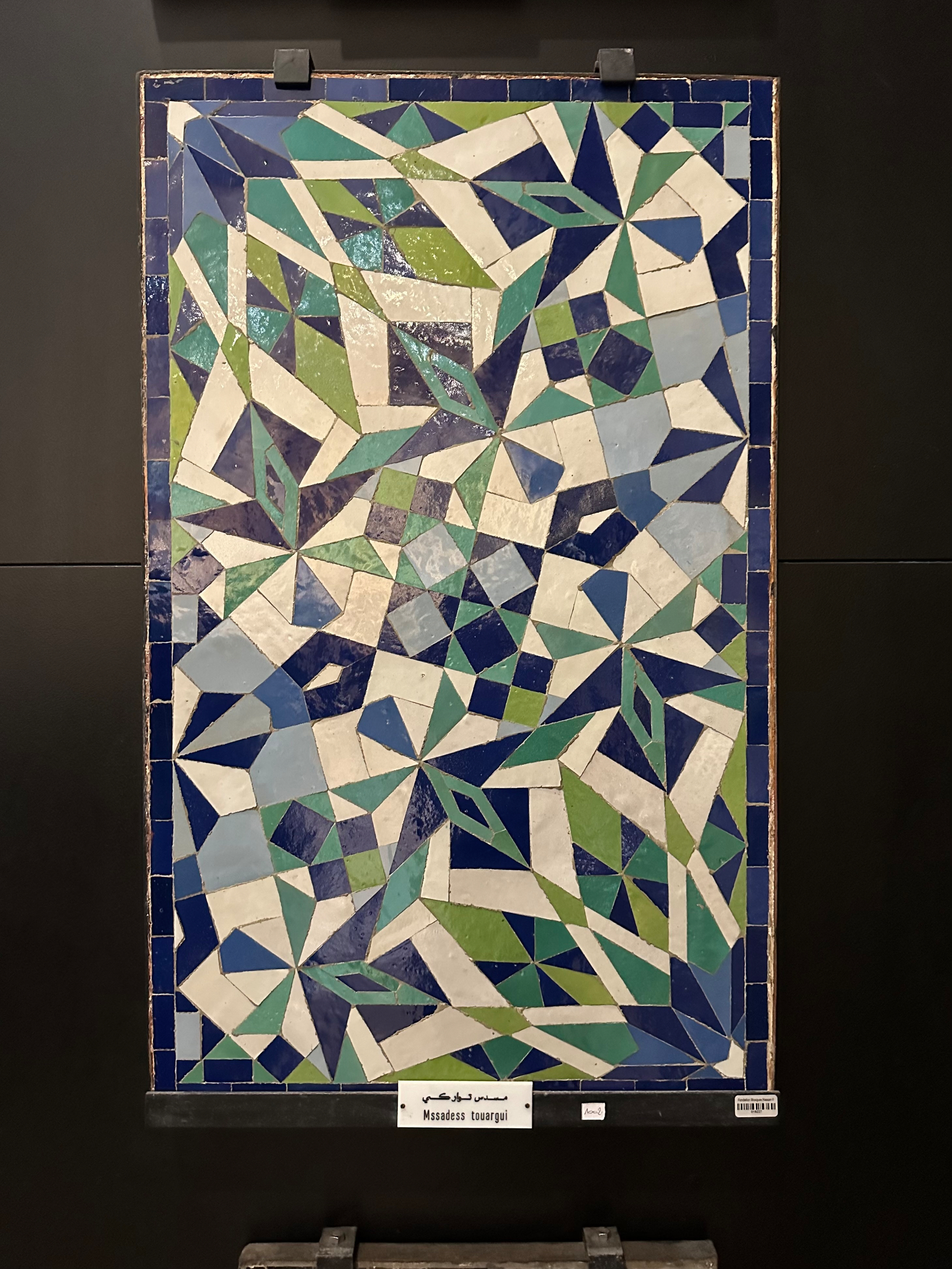
Looking up

Academy, Business, Charity, Mission
It was a college class on religion that taught me about the history of academia in the United States. Prof. Ferm walked us through why schools like Harvard, Yale, Princeton, and Dartmouth were founded, and what decisions they made as they grew.
Over my lifetime those lessons have come back to me often as I’ve considered the life cycles of other institutions of higher education. One of the big themes: many schools begin with a lofty vision of being a community, a “city on a hill,” an institution with a mission to serve the people of the region, a commitment to a creed and its advancement, etc.
And then, over time, they decide that the way to achieve longevity as institutions is to think of themselves as businesses. Which so often leads them to an awkward attempt to marry a business mindset with an eleemosynary or non-profit vision. And failing at both.
To be good at a business requires a sense of distinctiveness, a business proposition that makes one’s product the right choice. But when schools depend on similar sources of funding, accreditation, and assessment, the pressure to conform to competitors outweighs the drive to distinctiveness.
To be good at being a community built on a mission requires the community to be ever mindful of that mission, and to let it guide (at least at the macro level, if not at the micro level as well) major decisions. Fidelity to that mission might even run counter to balancing the books in the short term. It might require teaching donors why the mission matters rather than conforming the mission to the mission of donors. It might even mean telling accreditors what their standards are too low.
This is not an easy path to chart. A few schools divorce themselves from federal funding, but then find themselves in need of the funding of a few wealthy donors with their own missions. Some stick to their mission and find themselves living lives of poverty in order to keep the doors open. A rare few manage to continue to tell their own story to donors, and count on the alumni to believe strongly enough in what they experienced and gained to continue to fund it for those who come after.
I wish I had wisdom to say what a school should do. Instead I have charity enough to pray for those who must decide, and for those who will go through the education they provide, for those who might fund education through various means, and for those who will live with the consequences. Kyrie eleison.
Also reading Parker Palmer’s A Hidden Wholeness. I enjoyed his Let Your Life Speak, and am reading this one meditative as well. I appreciate the stories of academics who don’t fit neatly into academic life.
As a senior in college I started to read Middlemarch. I found back then that it was a book that wanted a reader who had time to enjoy it. College taught me to read fast, but not to read slowly, not to savor books. Now I am reading George Eliot slowly.
One of my students mentioned summitting Kilimajaro as a life goal in her term paper draft. I responded with a link to this documentary of my Middlebury classmate Chris Waddell, who summitted Kilimanjaro in an unusual and inspiring way.
Chance
In between editing chapters of my next book and commenting on student papers, I’m pondering the words “stochastic” and “tychism.”
Both have to do with randomness, chance, and hypothesis.
And those things make for some wonderful moments in life.
Next up: a private group discussion on the Peloponnesian War. We’ve been at this for over a year now, chiefly in primary texts. Such a good conversation.
Taught my students about Maimonides today and they had such good questions. Classes like that one really fill my sails.
Office Shelves and Optionality
A photo of part of my office.
My office is of course a place for me to do my work of teaching, scholarship, and service to the university.
It’s also a place where I serve tea to students as we talk about ideas both large and small.
And it’s a physical space that offers a glimpse of my story as a teacher, as a scholar, and as a person.
Often the space itself is a kind of lesson, and it becomes the beginning of conversations we did not plan.
I’m in a small city in the rural Upper Midwest, far from the coasts, far from the centers of power.
The students who come to my office hail from almost every state in my country, and from every populated continent. They come from big cities and rural ranches, wealthy suburbs and poor communities, and everything in between.
And so often when they first step into my office they say something like: wow.
Because many of them have never seen so many books, on so many topics, in so many languages.
Many have never had good tea, or good, open-ended conversation with a scholar who takes them seriously.
And I love the way this space fosters those conversations and maybe, just maybe, helps the students’ imaginations grow wider and richer.
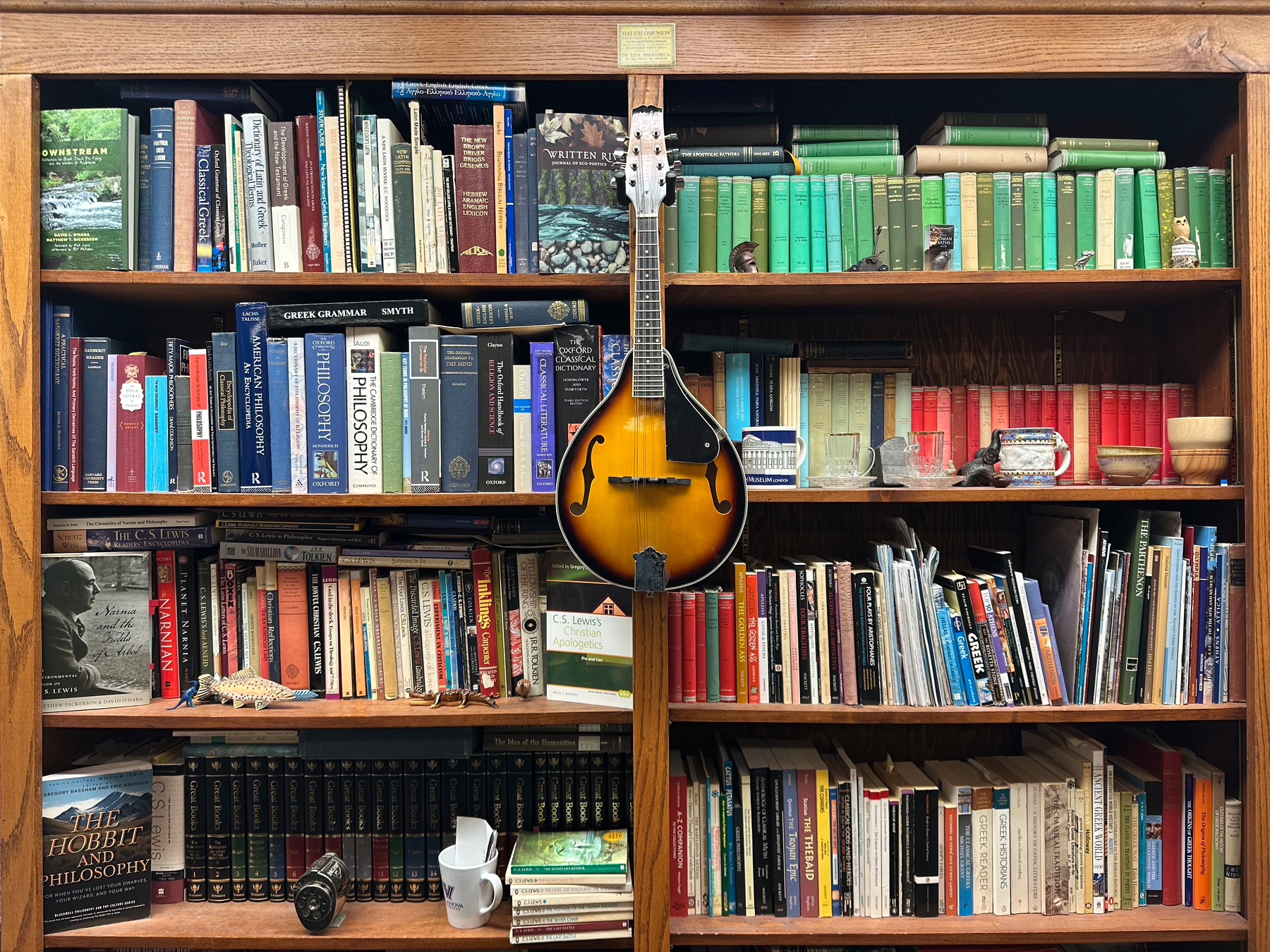
Giraffe silhouette. Sioux Falls Zoo and Aquarium.
A fine place to walk with my son and his wife and my grandson yesterday.
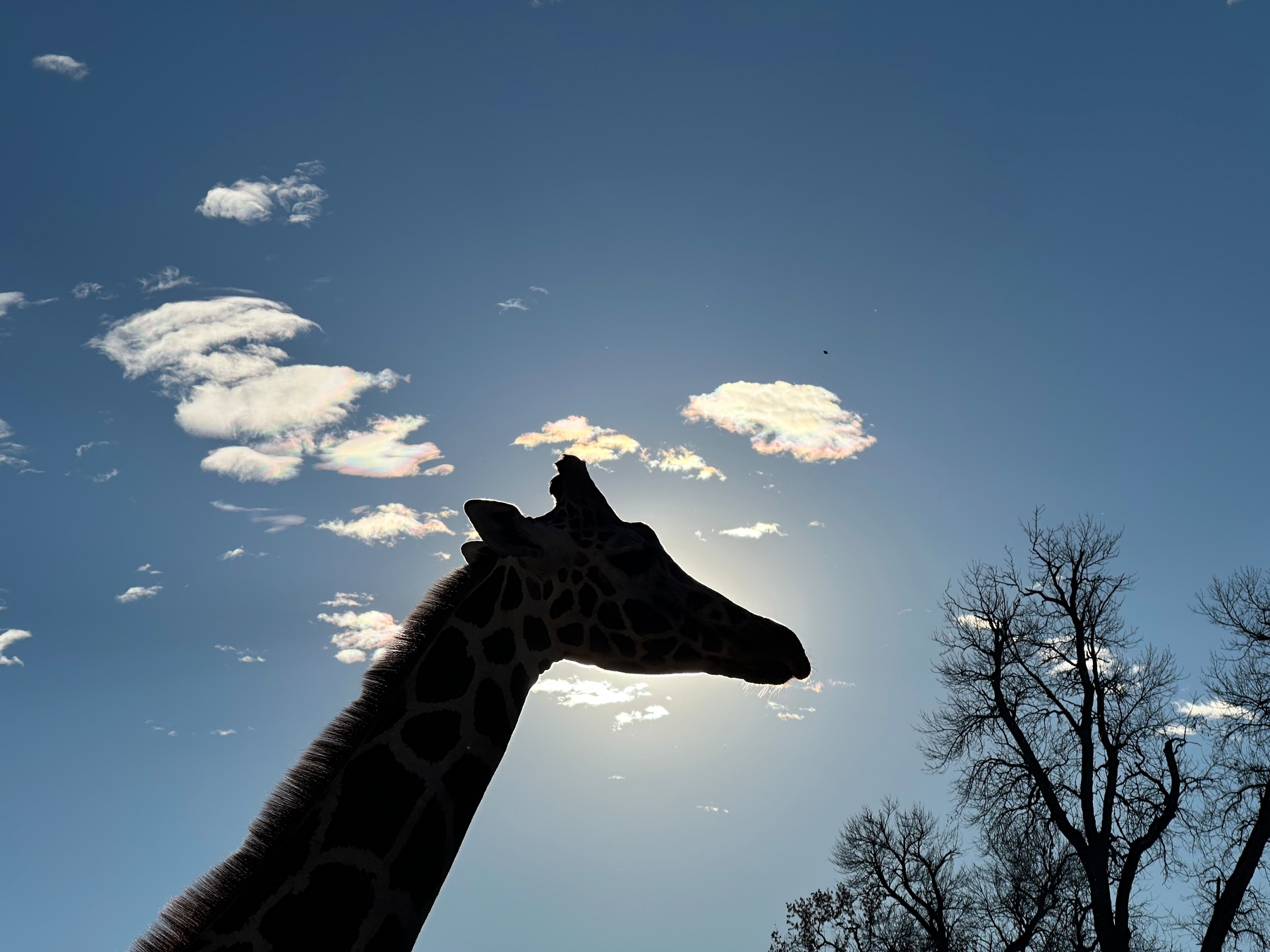
Shelfie
Shelfie. (The books that come off my shelves while having conversations with students in my office.) This was after an hour or so of meeting with students. I reshelve at the end of the day.
Shelfies help me reflect on the day’s informal lessons, and of the fun I have teaching across multiple disciplines.
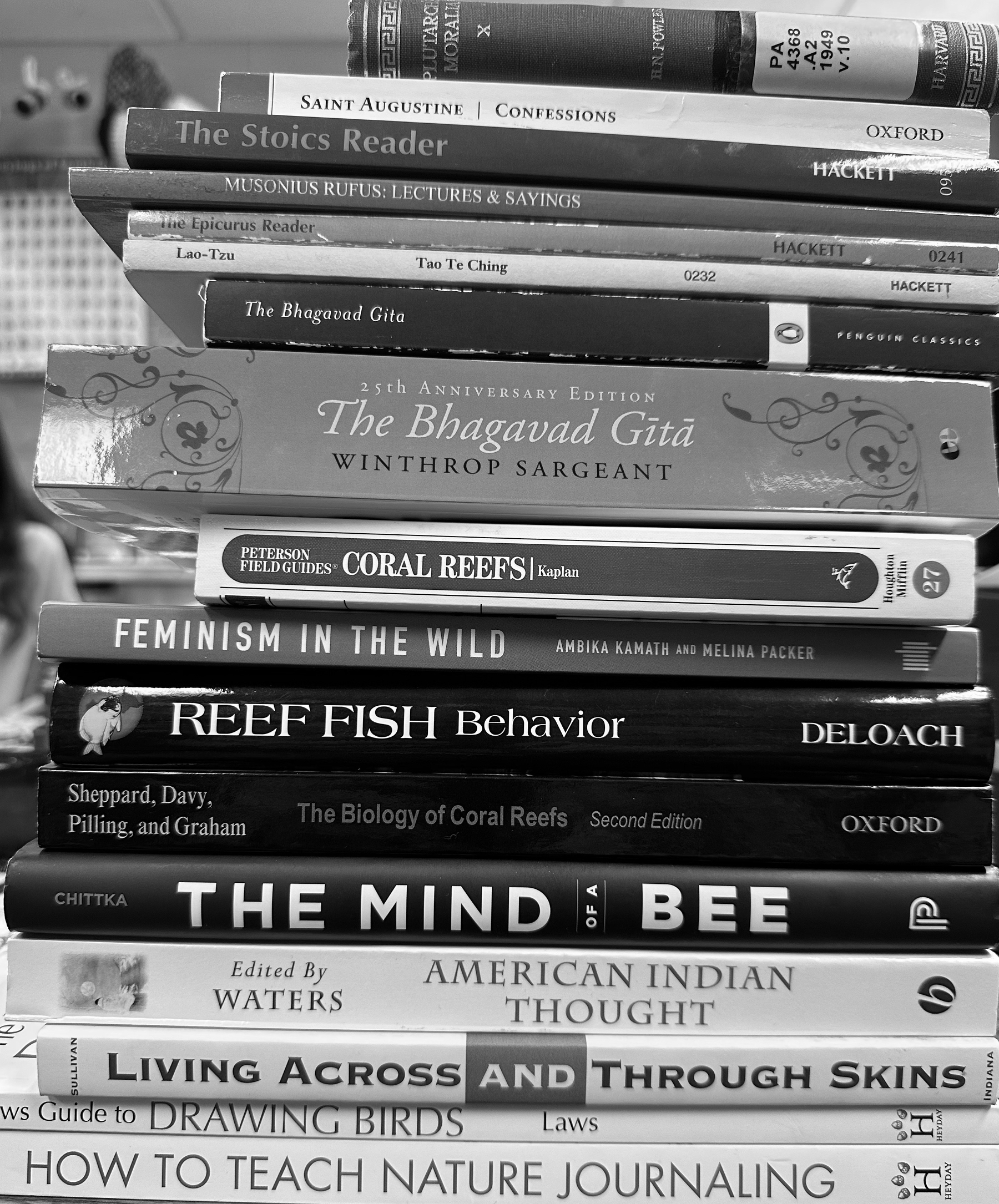
Sketching owls. This helps me know the owls better. Also having fun experimenting with different media.

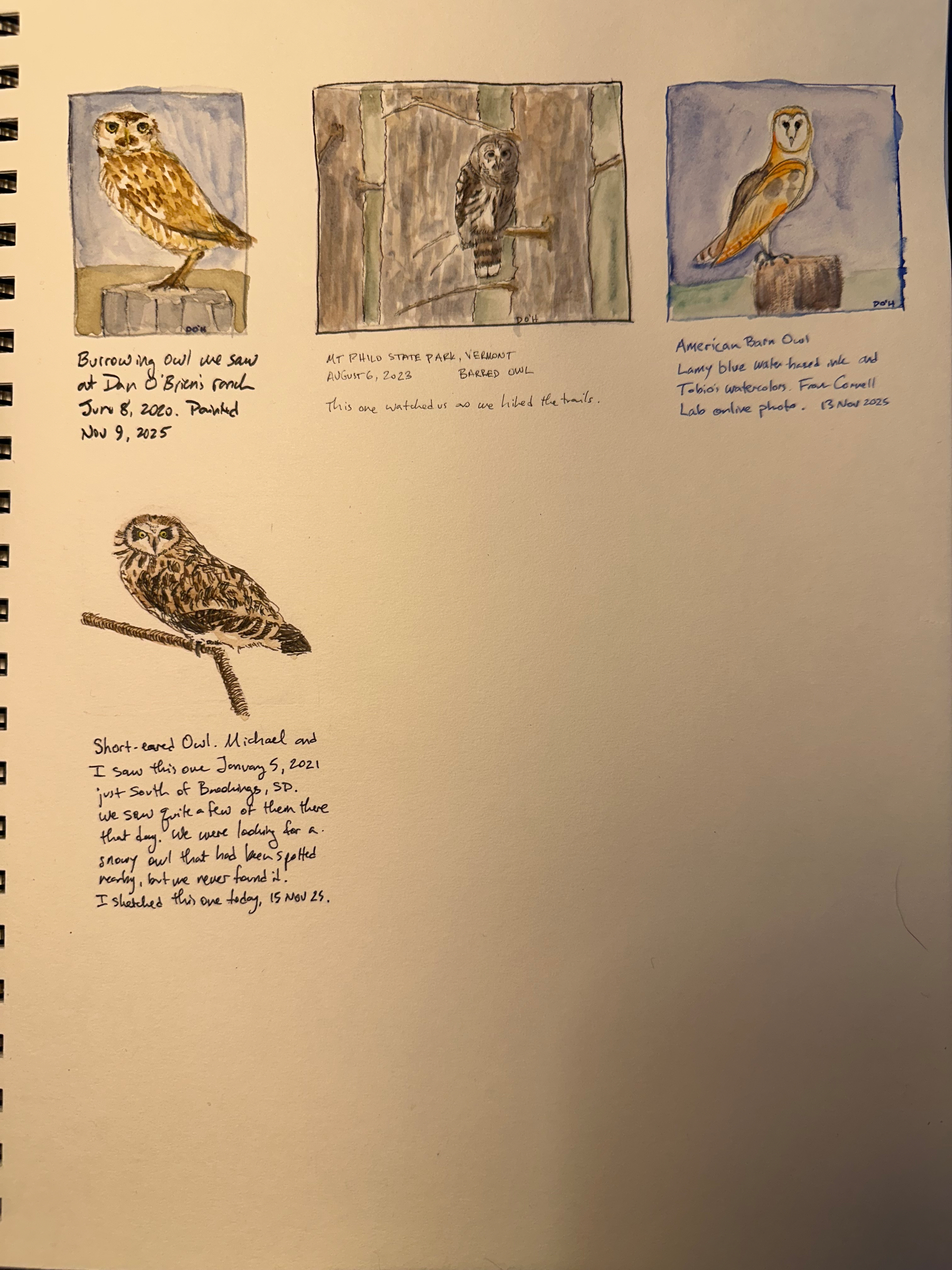
The Kids Are Alright
Today I had one of the best days of teaching I’ve had in a long time. I’m worn out and poorer, but what a great day.
This morning the weather was warm and sunny so my environmental philosophy class met outside and many of the students had short sleeves even though it’s the middle of November. We try to meet outside every day, but some days are a challenge. Today we heard term paper presentations about parasitism, west African birds, and land rights. Each paper was thoughtful and thought-provoking, and it made me glad to sit there and listen as the students spoke.
Right after that I helped our Registrar with her FYS class' required service project. I spent hours this week cutting cedar planks to the right size and shape to make four Adirondack chairs. Today I brought all the lumber and a carload of tools and taught the students how to build the chairs. For most of them it was their first time doing anything like that. There’s something very satisfying about learning how to build something new with your own two hands. And as Matthew Crawford pointed out in his book Shop Class As Soulcraft, learning how to use tools is an important part of a liberal education.
Next I dashed off to buy pizza for a midterm exam. Yeah, you read that right. My ancient and medieval philosophy class put Socrates on trial earlier this semester and I promised them a meal together as a treat after the trial went so well. I redesigned the midterm exam to be a symposium, i.e. a dinner party. Here’s the idea: I gave them a question to consider (Why does Aristotle write about God in Book Lambda of his Metaphysics?) and allowed them to research it, to research related topics in the other philosophers we have read, and then to come to class with books, notes, and ideas. We sat down at a table together and served the pizza, then we opened the floor with that question. I kept a “conversation map,” and the students knew that the aim was not really to answer the question but to talk about what the question opened up. And another aim was to make sure everyone participated in the conversation. By the end of the hour, most of the pizza was gone (we got good pizza, and it wasn’t cheap when the professor pays out of pocket, but it was worth it) and everyone in the class–including the ones who are usually quiet–had talked about the topic in a way that helped others to think more clearly. After class one student came up to me and said she wished there were more classes like that where we can talk about big ideas (God, for instance!) without fear of offending or being canceled. I think the pizza helped, and so did the ground rules (try to include others, don’t pontificate or grandstand, questions are better than flat answers, open-ended questions are better than ones that invite a single word in reply, etc). But really, the students get credit for being amazing interlocutors, and for caring for one another.
My last class of the day is How To Live Well. We’ve been discussing Augustine’s Confessions, and I’ve also been peppering the class discussions with bits and pieces of other great philosophical texts from around the world. Again, the students were attentive, they asked good questions, and they seemed to care for one another. Not quite a lecture, and not quite a seminar, that class is a little Socratic and mostly me just trying to introduce them to big ideas that might help them examine their own lives and to care for others better.
I went back to my office after that and spent the next hour and a half talking to a stream of students who want to do practical things to make the world better. They have ideas, and they need a little guidance, maybe an advisor for a project or a mentor. Those conversations are soul-filling, especially knowing that what these students begin they are likely to carry onwards.
So here I am at home, typing up a record of the day. My back is tired from carrying lumber and my knees are a bit worn from kneeling on the pavement while we assembled the chairs. I often wish I had a budget to help pay for the tools or lumber, or to pay for pizza, or to fund the projects the students want to begin. For now I remind myself: we don’t have much, but we have enough. And that’s not a bad place to be. The students are alright, and it’s a joy to spend my day working and thinking and talking with them, and watching them blossom and flourish.
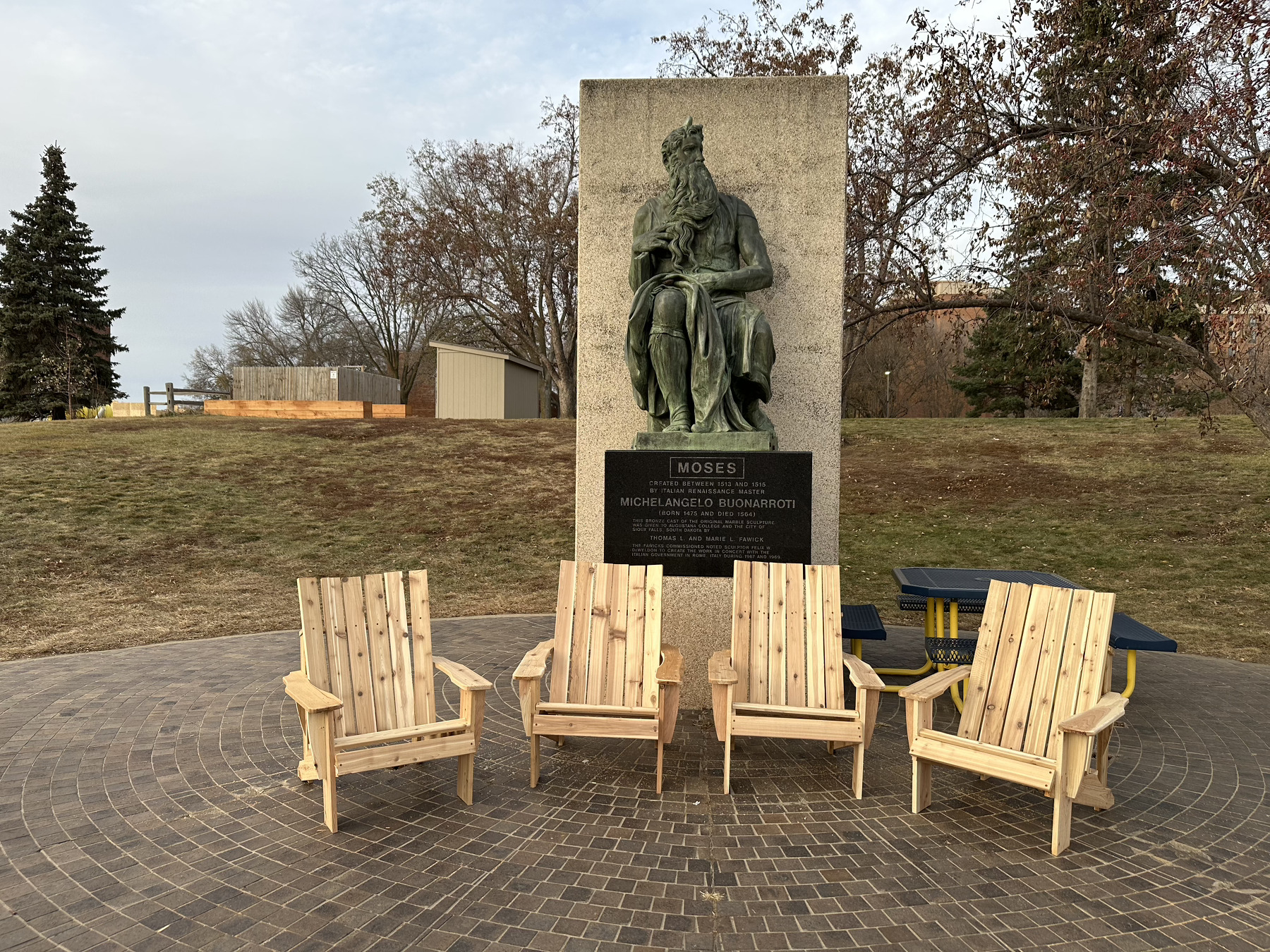
Taught twenty students how to make Adirondack chairs today. It was part of a class taught by our Registrar, and hopefully these chairs will provide a nice outdoor study spot!
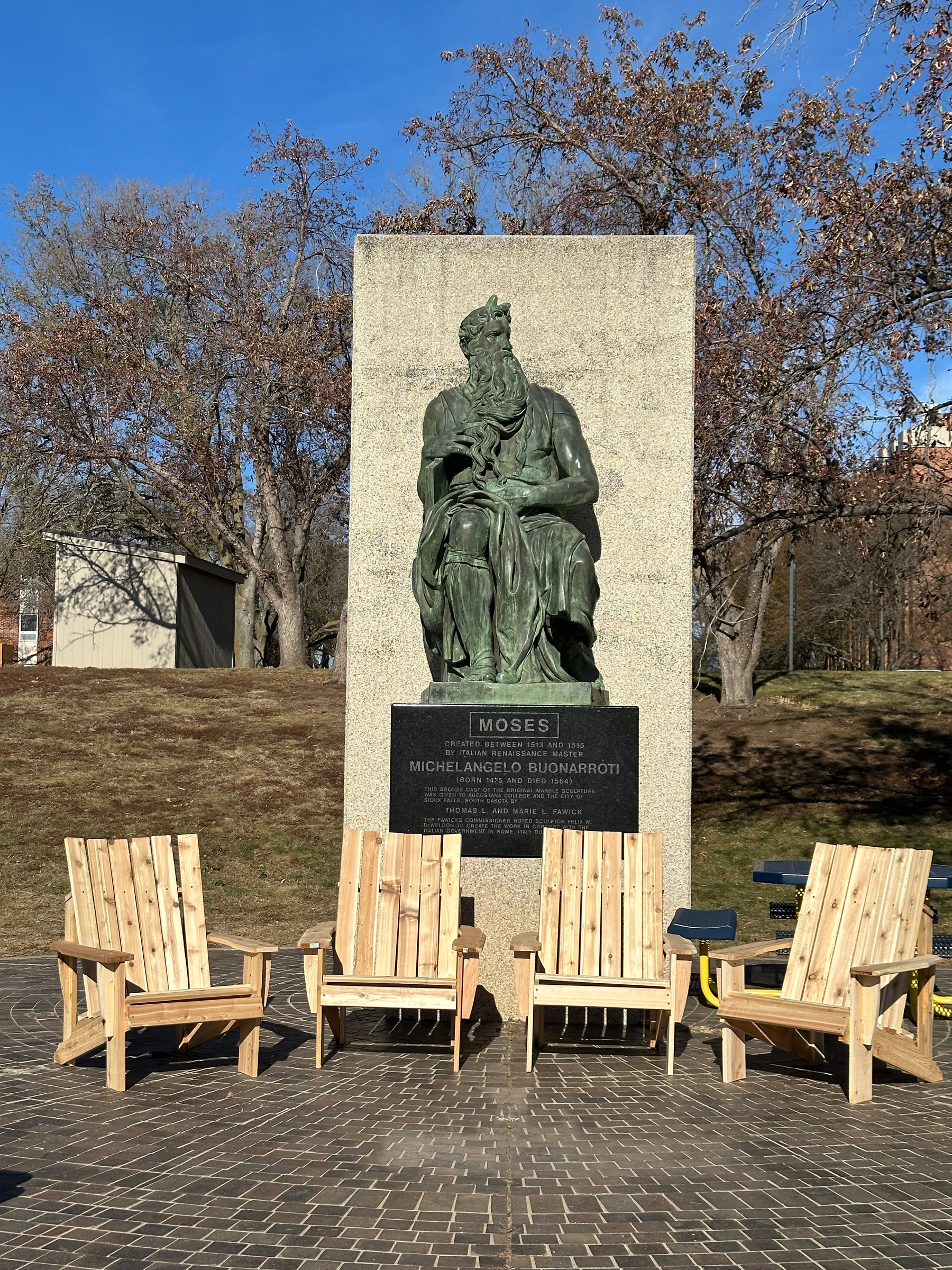
Watercolor Gifts
At lunch today a friend gave me a watercolor set. He said when he saw it he knew he had to buy it for me and I am honored by this. So I came back to my office and painted another owl for him.
The point, of course, is not to paint perfect owls.
The point is to offer gratitude for friendship, and to give “productivity” its meager due while getting to know the birds a bit better.
Other tasks will get their moment soon but not yet. First, I have to clean my brush and pen.
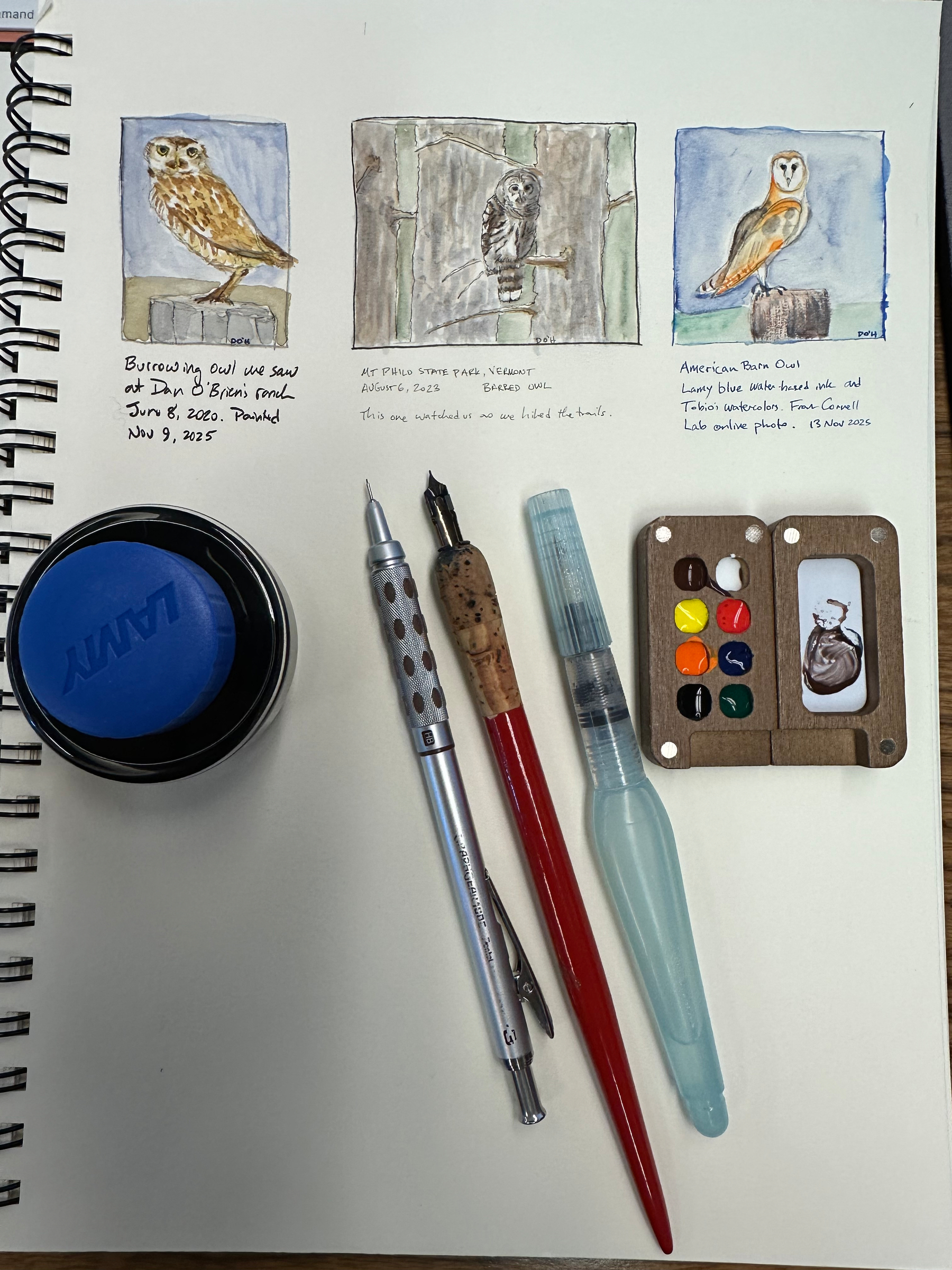
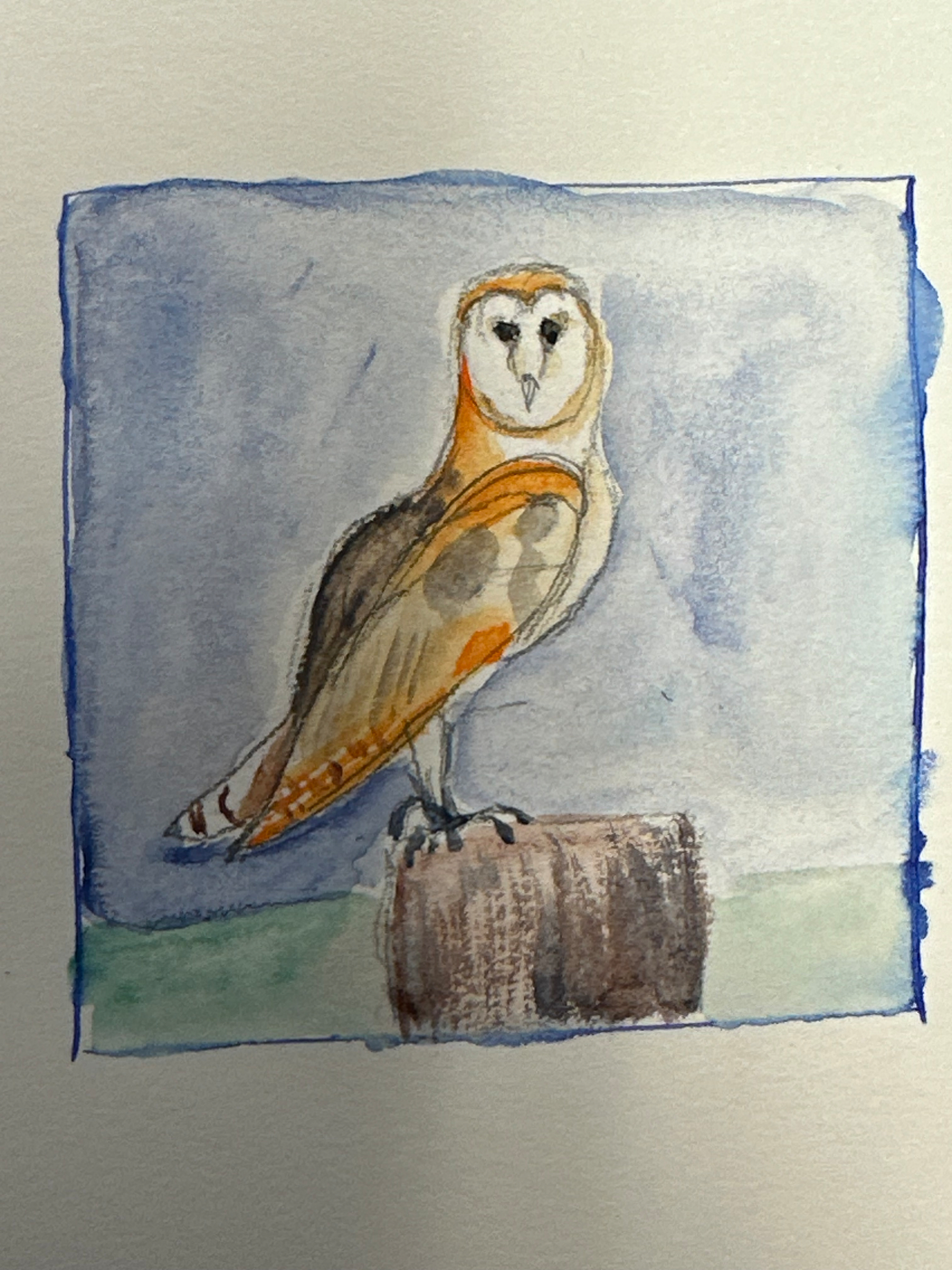
Pipe Organ
Pipe organs are one of my favorite instruments. Unlike most other musical instruments, these are built as part of the building that houses them. The building itself is the resonance chamber. Which means that when you enter the building you are entering the instrument.
Photo: Pipe organ in the Augustana University Chapel of Reconciliation.

Music of the Spheres
Last night’s Aurora Borealis display shifted all my social media to photos of crimson ribbons across green skies. I welcomed the mood of delight, and liked every such photo I saw.
For my ancient and medieval philosophy students last night was a bonus. They’re required to stargaze throughout the semester, and to indulge in wonder like that of the ancients who contemplated the “music of the spheres.”
At times like this I am reminded of the words of C.S. Lewis:
“Those who brood much on the remote past or future, or stare long at the night sky, are less likely than others to be ardent or orthodox partisans.”
He doesn’t say we won’t be partisans, but that certain types of contemplation can make partisanship less likely. That is worth considering, and worth practicing.
C.S. Lewis, “On Science Fiction,” in On Stories and Other Essays on Literature. (San Diego, New York, and London: Harcourt, 1982) 63.

Symbiosis, Timeframes, and Benefit
This morning I spoke to a nature writing class at Middlebury College. The class is about rivers, so I spoke to them about my own writing, and my work in mussel ecology.
Students had good questions, perhaps because they have a good professor, Matthew Dickerson, who has taken them on regular field trips to visit the rivers and streams around their college.
Some of the questions students asked:
- How did you get interested in freshwater mussels?
- What can be done to restore mussels when their habitat has been impaired or they have been extirpated?
- Mussels benefit from host fish. Do the fish get any benefit from mussels?
I want to dwell on that last question for a moment:
Biology textbooks generally talk about symbiosis as being mutualistic (both species benefit), commensalist (one species benefits, one suffers no harm), or parasitic (one species benefits, one suffers harm).
There’s more to it than that, but that’s a big-picture overview: when we talk about symbiosis we want to know whether there is competition for resources (including the lives of the organisms involved), and which organisms gain benefits.
It’s a useful way to discuss the interaction between individuals in the short term.
Another way of looking at it is to think about the effects on populations and on ecosystems over a longer period of time. In other words, we can shift what we mean by “benefit” and examine it over the long run.
Most of the 300 or so species of freshwater mussels native to North America (mostly Unionidae species) have obligate relationships with host fish (or salamanders). A gravid female mussel mimics something fish eat, and when the fish bite, the young mussels (glochidia) are released into the fish’s mouth where they clamp down on the gills and other tissue, catching a free ride to their next home.
For a while, they live inside the fish, protected from predation and kept in the clean water that both fish and mussels need to survive. Eventually, they let go of the fish and find new homes in the river bottom, where they will likely stay for the remainder of their lives.
While the glochidia are attached to the fish, the fish has an immune response to the glochidia that eventually can protect the fish from future parasitism. If it sounds unattractive to have something live safely inside your lungs until it finds a new home, that might be how the fish feel, too.
So we could classify the mussels as obligate parasites. Obligate because they need the fish as both midwives and nurseries for their young, and parasites because the mussels benefit while the fish do not.
But if we expand the timeframe and the notion of benefit, we see a different picture. Mature mussels are filter feeders that can filter gallons of water a day. In a river or lake with a healthy mussel population, the water is cleaner, which makes it easier for the fish to breathe, and for the sunlight to reach further into the water, stimulating growth at a range of depths.
While the individual fish that plays host to the glochidia might be mildly harmed, without the mussels that already exist, that fish might not survive. And the fish’s descendants, perhaps many generations in the future, will benefit from the mussels that their ancestor carried at some personal cost.
In simpler terms: the grandparent might pay a price of hosting mussels in order for their grandchildren to live in a healthy environment. The hosting is a cost, but the thriving of the grandchildren is a benefit. It all depends on whether we are looking at the individual or the population, and whether we are thinking in the short term or the long term.
Of course there are other factors, and not all mussels, not all fish, and not all waterbodies are the same. But hopefully this one oversimplification serves as a counterbalance to another oversimplification in which we think only about short-term benefits for individuals.
I’ll end with a regret: I didn’t get around to talking about the importance of sketching what you see. I even had my sketchbooks and some excellent nature journaling books by my teachers John Muir Laws and Robin Lee Carlson on the desk beside me. But the conversation flowed in a different direction, so we never wound up touching on art. Oh, well. Next time, maybe.
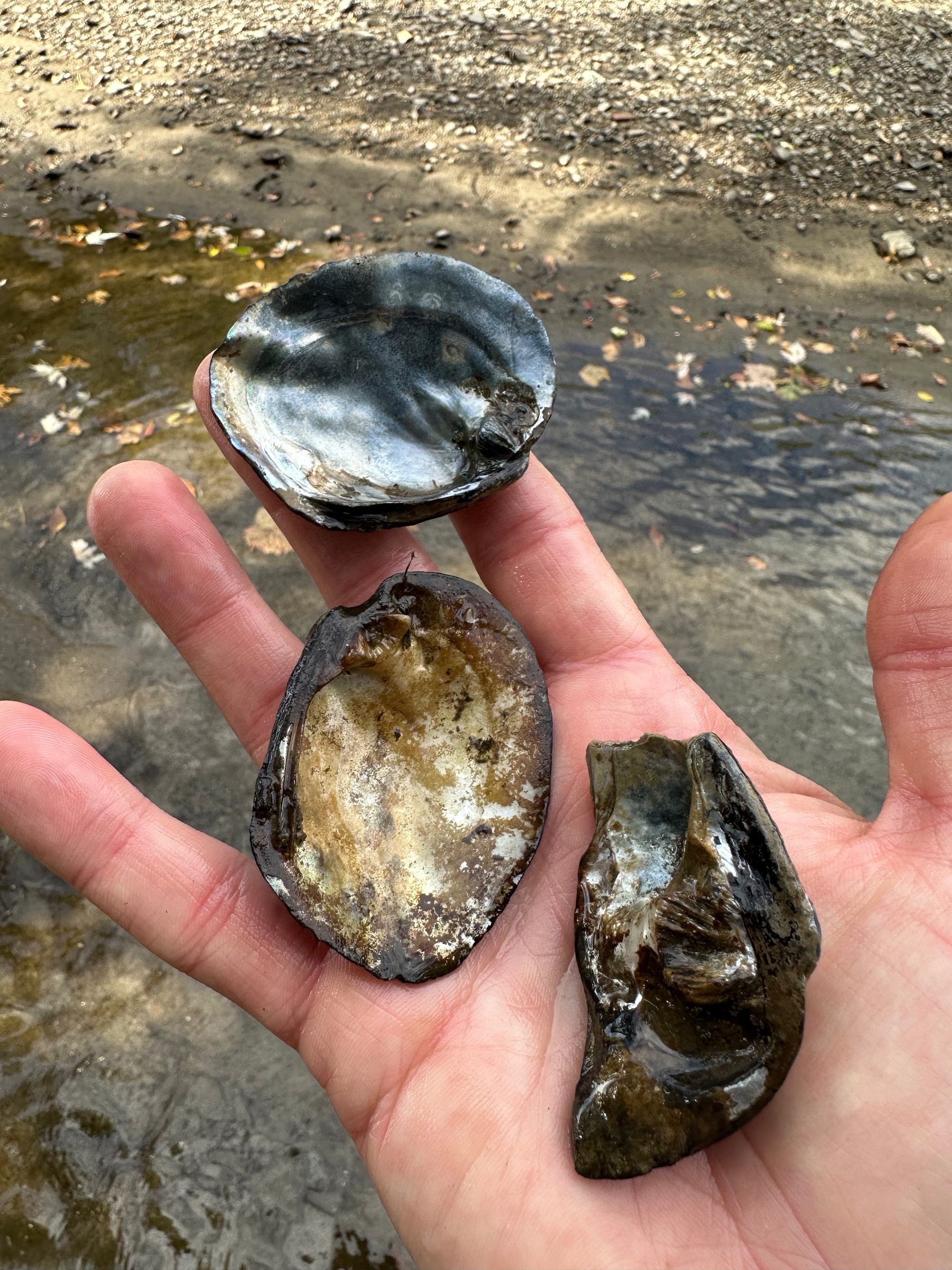
The Humanities, The Common Good, and Immediate Needs
The U.S. has an abundance of good colleges and universities. Many, facing budgetary challenges, choose to eliminate humanities programs.
Those programs (esp languages, history, and other programs teaching about cultural distinctives and communication) can benefit national security, diplomacy, and trade.
But enrollment in those disciplines is trending downwards, in part because they cost the same as any other degree, require hard work, and don’t lead to obvious high-earning jobs.
The benefit to the nation is more people who can help us all understand other nations.
The cost to the individual is money spent on an investment with a very long and potentially thin tail.
I studied languages in high school and college: Spanish, French, German, Russian, Greek, Latin. Also picked up some Nepali, Hebrew, Sanskrit, and a smattering of a few dozen other languages.
If you graduate with a degree in languages, people ask: are you going to teach or are you going to translate?
And I’ve done both of those things, but mostly I’ve used languages for other reasons, like:
- Reading news and scholarship that is not available in my primary language
- Teaching and doing research abroad
- Helping people in other nations to develop businesses
- Simply connecting with local people around the world
And I’ve learned a lot of poetry, scripture, and other literature in other nations. No matter where you are, if a book has lasted centuries, it’s probably got some story worth reading that will help you live a better life.
My students sign up for my humanities classes because they satisfy a general education requirement. Most of them don’t long to study philosophy, great books, history, or literature.
Thankfully, many of them wind up liking what they read. Often, students will take these classes in their final year of university, having put off something they dreaded, only to find they wish they’d taken it earlier so they could study more.
I also find that people who have been out of university for a long time wish they could return to school. Not for the homework and exams, but for the reading and discussion of big ideas.
Maybe fifteen years ago I offered to lead a semester-long in-person discussion at local pubs for people interested in studying Classical Chinese philosophy. I limited it to a dozen people so we could have seminars. Within an hour of offering the seminar on Facebook and Twitter, I had 45 people request to be let in.
It seems to me that universities are stuck in old ways, requiring a four-year degree for recent high school graduates, and then creating internal systems that make faculty across disciplines into rivals competing for curricular turf.
We could do things very differently.
If, instead of regarding students as clients, we regarded them as fellow citizens and fellow learners, we could show them what it looks like to continue to learn (presuming that we faculty do continue to learn, of course).
And we could invite them to study both skills that will help them to earn a living and attitudes about learning that will help them grow into a vocation, a calling, a full life.
We could even offer them tools that the world needs them to have, like deep engagement with old stories that invite a lifetime of reflection, and a useful understanding of the languages, literatures, histories, and cultures of the world.
Our universities are not only like large ships that do not turn easily; they’re also like large ships in narrow canals. Even if the pilots wanted to turn, the walls of the canal prevent changing course frequently.
Thankfully, what happens on individual decks of the ships often has a little more flexibility. Individual departments, honors colleges, and a few of us faculty who are willing to do far more than we are paid for wind up making a difference.
An administrator of one university recently told me that their faculty’s only value to the university is in the easily quantified number of bodies in seats in classrooms. I did not dwell too long on that because I had a grieving student who wanted to talk about her dying parent, and after that I was off to volunteer my time with a global technology challenge that benefits my university in numerous ways that are hard to quantify. I did spend a little time praying for that administrator and her faculty, though, because it sounded like they’re all feeling immense pressure, and responding poorly.
For now I will continue to be one of those faculty who meets with grieving students, who teaches students how to build furniture and how to grow food, who takes students on field trips, who mentors students in building skills, technology, and businesses, who volunteers with my city, with local high schools, and with non-profits. And so much more.
Because I don’t just teach classes. I teach people.
And because I believe that the formal curriculum is a mere shadow of what faculty offer through mentorship, community connection, lived experience, and relationships that grow over time.
And I hope—perhaps naively—that the result will be a long-tailed return for the whole world.